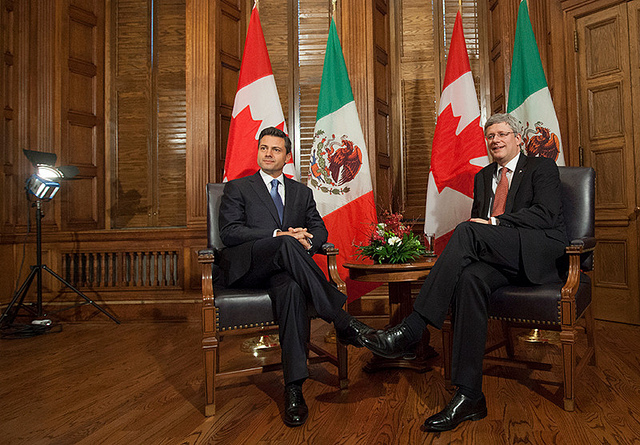Like this article? Chip in to keep stories likes these coming.
Canadians love Mexico especially when crystalized ice on window panes trigger thoughts of sandy beach retreats from Canada’s punishing winters. Over 1.9 million Canadians turn to Mexico as their getaway destination.
In Mexico, however, thousands are seeking refuge from poverty and the human rights crisis, most recently brought to the fore by the disappearance of 43 students from the Ayotzinapa teacher’s college in Guerrero, Mexico.
Ayotzinapa was the straw that broke the camel’s back for Mexicans smack in the middle of a militarized drug war since 2006; the student disappearances sparked historical mass mobilizations in Mexico and solidarity marches around the world.
But Ayotzinapa didn’t get much traction in Canada, especially among federal politicians. To talk publicly about human rights abuses in Mexico as systemic would be an inconvenient truth for Canada as it continues to entrench its economic relationship with its partner south of the border.
A legacy of deals
Economic ties were forged with the signing of the North American Free Trade Agreement (NAFTA). Last year marked the 20th anniversary of NAFTA, and the year Canada and Mexico renewed their joint action plan with promises to further and deepen free trade bilaterally and also extend trade to Asia through the Trans-Pacific Partnership Agreement (TPP).
In the action plan signed in February 2014, the two countries also agreed to regulate migration, promote tourism and temporary labour flows, and advocate bilateral interests internationally and regionally.
An agreement between North American partners to pursue mutual interests may sound good on paper, but you have to read between the lines to find the fallout from policy gaps.
Seeing through rose-coloured glasses on human rights in Mexico
In the last eight years, the Harper administration has overhauled Canada’s immigration and refugee policies. According to a report by the Migrant Mothers Project, there is now increasing focus on criminalization, narrowing rights, restricting access to Canada, while reinforcing temporary labour. In this political context, Canada has fostered a selective relationship with Mexico.
During Harper’s visit to Mexico last year, Mexican President Enrique Pena Nieto pressed Prime Minister Stephen Harper about the pesky visa requirement imposed on Mexico in 2009 to curb alleged bogus refugee claimants. Since the administrative hoop was introduced, claims for asylum have dropped by 85 per cent according to the government. But Harper has refused to lift the visa requirement, saying it is a matter of national security.
To add insult to injury, in 2012, under Bill C-31 Canada placed Mexico on a list of designated countries of origin (DCO) to determine refugee status. It was a move to deter abuse of the refugee system by creating a stream of claimants from ‘safe countries’. The Canadian Council for Refugees points out that under the new rules of the two-tier system; faster processing times make it almost impossible to properly file a claim for refugee status.
But Mexico’s human rights crisis is staring Canada in the face. According to Amnesty International, there are six times more reported cases of torture and ill-treatment than a decade ago. The 43 disappeared in Ayotzinapa are only a needle in the hay stack of more than 80,000 estimated dead and 26,000 disappeared in the last eight years.
Reports estimate that 70 per cent of Mexican municipalities are infiltrated by drug cartels. And an Amnesty International survey found 64 per cent of Mexican citizens are afraid they would be tortured if detained by the authorities. This generalized context of corruption, impunity and fear is one of the reasons that Mexicans are seeking a way out.
Canadian authorities know this. After Ayotzinapa, Canada issued a travel advisory in November, warning tourists to exercise a high degree of caution when visiting certain regions in Mexico.
The travel alert still stands. Mexico remains on Canada’s list of ‘safe’ countries — places considered to respect human rights, offer state protection and that don’t “normally produce refugees.”
Some 20,000 make it to Canada through the touted Seasonal Agricultural Workers Program. Ironically, many agricultural workers have been pushed out of Mexico due to unfair competition created by U.S.-subsidized agricultural goods “dumped” into Mexico under NAFTA.
According to the Council of Canadians, the promises of NAFTA were “totally empty.” Most Mexicans continue to live in poverty and their declining wages are catching up to those in China.
In Canada, temporary workers generally have fewer rights, restricted or no access to permanent residency, minimal benefits, difficult working conditions, and are vulnerable to abuse. It’s a tough pill to swallow.
Despite this unbalancing act, the Canada-Mexico Joint Action Plan praises and sets out to strengthen this type of program.
Just the cost of doing business?
The renewed Canada-Mexico Joint Action Plan calls to further mutual interest through global and regional mechanisms and institutions, like the Regional Conference on Migration (RCM). While RCM does set out objectives to control illegal migration, it also calls on states to respect human rights regardless of migration status.
Canada appears to be picking and choosing policies inconsistent with its own criteria (re: Mexico remains on ‘safe’ country list while travel advisory is issued for Canadians) and international human rights obligations (re: criminalization and two-tier refugee system), while encouraging the flow of goods and temporary labour (re: Seasonal Agricultural Workers Program).
As the Harper administration moves forward on its joint action plan with Mexico, it’s time to consider an inconvenient truth: Canada’s migration and trade policies are supporting social and economic inequality across and within our borders. It’s time to make good on the promise of mutual benefit in relationship with Mexico.
Elvira Truglia is a Montreal writer and works in communications, public engagement and community development. She is the former Montreal Regional Coordinator for Multimedia & Multiculturalism, an initiative of the United Nations Association in Canada to promote social inclusion and fair representation in the media.
Photo: flickr/Stephen Harper



